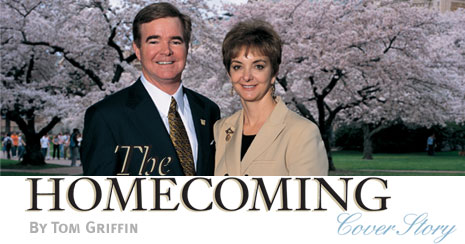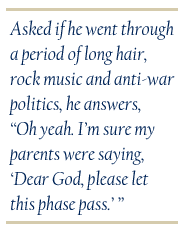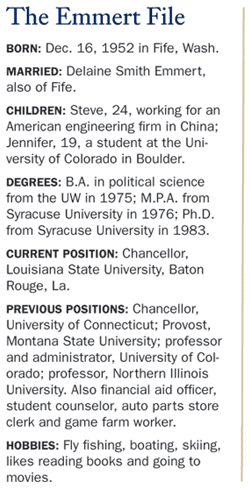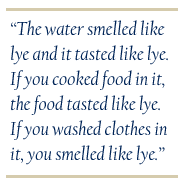
Although Emmert loved history and literature, he chose political science for his major. "[Political Science Professor] Hugh Bone was wonderful and had a huge impact on my excitement for politics and government. He helped convince me to turn to public administration," he says.
Emmert roomed with his high school buddy, Jerry Herting, the whole time he was a student. They lived in several apartments before sharing a house in Wallingford with two other roommates from Fife. "Mark was one of the more driven guys at that time. You could tell that he was going to continue on in school," says Grab, who also lived at the house.

When they weren't studying, sports was part of their student experience. They played on IMA softball teams and went to Husky football and basketball games. "We were there for Don James' first year and we were hopeful that something was going to change," Grab says.
Herting says there were plenty of nights when they would sit down and play guitar ("Mark is a better singer than I am," he says). Like many other students of that era, there were plenty of nights playing foosball at the Duchess Tavern or talking politics and movies at the Last Exit on Brooklyn coffeehouse.
But hanging over their lives was the war in Vietnam. Like every other 18-year-old male, Emmert was subject to the draft. "Sitting in front of the TV, watching your number pop out, it personalized the experience of the war," he says of the draft lottery.
Because President Richard Nixon was winding down the draft at that point, even Emmert's relatively low number of 124 did not get called up. But he had classmates and cousins who went to Vietnam, and one high school acquaintance—Ed Zumwalt—never came back. "You knew people who were getting shot, or serving, or even dying," he says. Asked if he went through a period of long hair, rock music and anti-war politics, he answers, "Oh yeah. I'm sure my parents were saying, 'Dear God, please let this phase pass.' "
But in addition to school, sports, music and politics, Emmert and his roommates also had jobs. "All of us were pretty much putting ourselves through school," Grab says. Emmert worked at Autovia, an auto parts store on 47th Street and the Ave.
He had always loved cars and drove a 1965 Ford Mustang in high school, so the job was a good fit. But it also kept him from taking advantage of all that the UW offered. "I always worked. In retrospect, I probably worked too much," he says. "Were I to go back and do it again, I would do it differently. I would have done the UW more intensely."
Instead, his intensity was aimed at an English sports car. "I was a sports car nut. I lived and died for my little Austin-Healey," he admits.
"Mark had a sports car addiction," adds Herting. Spear recalls many times when they'd go to the old Seattle International Raceway for autocross races. Drivers tried to get the best time while negotiating a twisting course marked out with traffic cones. Emmert was one of the better drivers, says Spear.

But there came a time when the passion had to end. "One of my great decisions when I was finishing up at the UW was to go off to graduate school or get serious about racing cars. I'm still not sure I made the right decision," Emmert jokes.
At first he thought about law school, but decided the subject wasn't the best fit. His mentors in political science—Hugh Bone and David Paul—suggested a relatively new degree, a master's in public administration. "The more I looked into it, the more I thought about becoming a city manager. It seemed a great nexus of politics, management and public policy," Emmert recalls.
"Everybody kept saying the strongest program for what I was looking at was Syracuse University," he says. Once he was accepted, he realized there was almost no financial aid in the master's program. "I sold everything I owned, including my beloved Austin-Healey," he says. "My mom helped put me through school. It was very expensive. Looking back on it, and knowing my parents' relative income, it must have been a staggering amount of money."
When he walked in the door at Syracuse's Maxwell School of Public Affairs, he wanted to work in city government. But it wasn't long before higher education took over. "A number of faculty members asked me if I ever thought about becoming a professor. To be perfectly honest, it hadn't crossed my mind, and then it was like a light bulb going on," he says.
After earning his master's in just one year, Emmert knew he wanted to come back someday for his Ph.D. but had enough of the student life. So he headed for Riverton, Wyo., where he became director of student aid at Central Wyoming College, one of the state's seven community colleges. The college had several branches, including one on the nearby Wind River Indian Reservation, where Emmert lived in a trailer.
"I was looking for something very, very different from what I'd ever done," he says. He got his wish. He met great people ("Friends for life," he says) but he also found poverty, high unemployment, alcoholism and drug abuse. "It was the first time in my life I confronted real deprivation and challenging social environments of that magnitude. Here I was, growing up a middle class kid in safe and sane Fife, and it was a whole different world. I saw people trapped by their social circumstances.

"I learned up a lot, I grew up a lot. Prior to that, I thought—like probably a lot of Americans—that anybody who pulls up their socks and works hard can achieve anything. You look at some of those circumstances and you say 'It's not that simple,' " he explains.
Spear visited his cousin and was struck by the primitive living conditions. "At night you could hear the rat traps going off as they caught something," Spear says. "The water was so bad, you had to treat it with lye. So the water smelled like lye and it tasted like lye. If you cooked food in it, the food tasted like lye. If you washed clothes in it, you smelled like lye."
Perhaps it was the isolation that prompted Emmert to finally get serious about his long-term relationship, since it was then that he asked Delaine to marry him. "We had always corresponded and stayed in touch, even when we were really mad at each other. We concluded that we really did love each other and, after all this nonsense, we were soul mates, so we got married," he says.
Go To: Page 1 | Page 2 | Page 3 | Page 4 | Page 5 | Page 6
Sidebar - Hot Topics: Emmert on the Issues